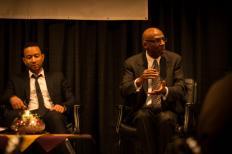






 John Legend and Geoffrey CanadaAn alarming achievement gap continues to plague Madison’s school district, but the Urban League of Greater Madison hasn’t relinquished its fight to change the patterns.
John Legend and Geoffrey CanadaAn alarming achievement gap continues to plague Madison’s school district, but the Urban League of Greater Madison hasn’t relinquished its fight to change the patterns.
And Thursday afternoon at the Alliant Energy Center, two major advocates for education reform lent their voices to the local effort.
John Legend, nine-time Grammy Award winner, along with author and children’s advocate Geoffrey Canada, helped kick off a two-day Education Innovation Summit hosted by the Urban League of Greater Madison.
Kaleem Caire, local Urban League president who led last year’s effort to set up a charter school aimed at students of color, welcomed the opening-luncheon crowd of roughly 100.
He said that since the proposed charter school was voted down last December, concerned parents have raised various theories about why roughly half of African-Americans students and 40 percent of Latino students don’t graduate from high school within four years, compared to 16 percent of white students.
Most opinions, he said, attempt to target who’s responsible and add to a divisive “fracture in this community.”
Caire said arguments have ranged from irresponsible parenting to right-wing conspiracy theories blaming a white power-structure.
Caire favors a wider, historical consideration that accounts for poverty and changes in criminal sentencing which disproportionately affected the black community.
Ken Taylor from the Wisconsin Council of Children and Families agrees that poverty has significantly impacted families of color. In 2010, African-American children in Dane County were 7.4 times as likely to be poor as white kids, he said. The national figure was 3.1.
But, Caire said, the biggest misperception about the achievement gap is that the same disparities exist across the country and that the problems are insurmountable.
“You guys, that’s just not true,” he said.
Madison Magazine and WISC-TV’s Neil Heinen moderated the luncheon and invited Canada and Legend to share their thoughts on how Madison’s challenges might be tackled.
Canada is president and CEO of the Harlem Children’s Zone, a non-profit geared toward educating Harlem students. He was also featured in "Waiting for Superman," a documentary about public education which won the Audience Award at the 2010 Sundance Film Festival.
Canada said that when schools fail to give students the skills they need to succeed, schools have failed the students.
“When you have those kids failing, your institutions need to change,” he said.
When a student falls behind in education, and teachers don’t respond with proper instruction, student failure is a matter of “physics,” he said.
They will struggle to catch up to their peers and are more likely to add to the black holes of jails, welfare, and food stamps that suck tax dollars and bury communities, he added.
“People are doing this all over the country, proving it’s not the kids,” he added. “It’s the structure, and it is the adults that have to be changed. There’s some personal responsibility that has to be taken: we’re not going to allow the same thing that’s been going on to [keep] going on.”
Canada challenged school districts to rethink their approaches to education by engaging students; “to prove something can work, then scale that up.”
“We’re not saying privatize education, we’re saying let’s try some innovation, hold some people accountable, this is moderate stuff, but because the climate has been so resistant to change it sounds revolutionary,” he said.
Legend recognized that nationally, school districts face limited budgets but said countries with fewer resources are doing a better job of educating their students.
“You can’t run from this, you can’t say ‘the [problem] is in their neighborhood,’ ” he said. “This is your city; this is your country.”
Friday’s Education Innovation Summit will begin at 8 a.m. at Monona Terrace and will include keynote speeches from Dr. Howard Fuller, founder and director of the Institute for the Transformation of Learning at Marquette University; and Dr. Patrick Murphy, Superintendent of Arlington Public Schools.
Breakout sessions will include: Innovative school models and parent engagement strategies, and successful student engagement through restorative justice.
|
|
|
Welcome to the Madison Commons, a website designed to provide news and information about all of Madison's neighborhoods and a crossroads for the discussion of community issues. The name comes from the idea of a village commons, a place for news, talk, debate, and some entertainment, too, that's open to everyone.
All rights reserved. Read more about the Madison Commons and its partners.


Comments
Reality Check
But, Caire said, the biggest misperception about the achievement gap is that the same disparities exist across the county and that the problems are insurmountable.
“You guys, that’s just not true,” he said.
_____________________
Unfortunately, it is true. What is remarkable about the black/white achievement gap is actually how stable and consistent it has been, from a statistical point of view, across time and across geographic regions of the country. Since it was first observed decades ago, the achievement gap always and everywhere has been about one standard deviation. It closely correlates to the one standard deviation that separates average black and white IQ scores, a gap which has held more or less constant from the beginning of the 20th century, continuing on through the civil rights/desegregation era, NCLB and right up to the present moment. Not even the Canada, the superstar of the charter school movement, has found a way to eliminate the achievement gap. Educators who tell you that there's an easy solution are lying. If the Urban League is so sure that they know how to eliminate the gap, let them run a charter school and prove it! The educational world would love to know their secret.